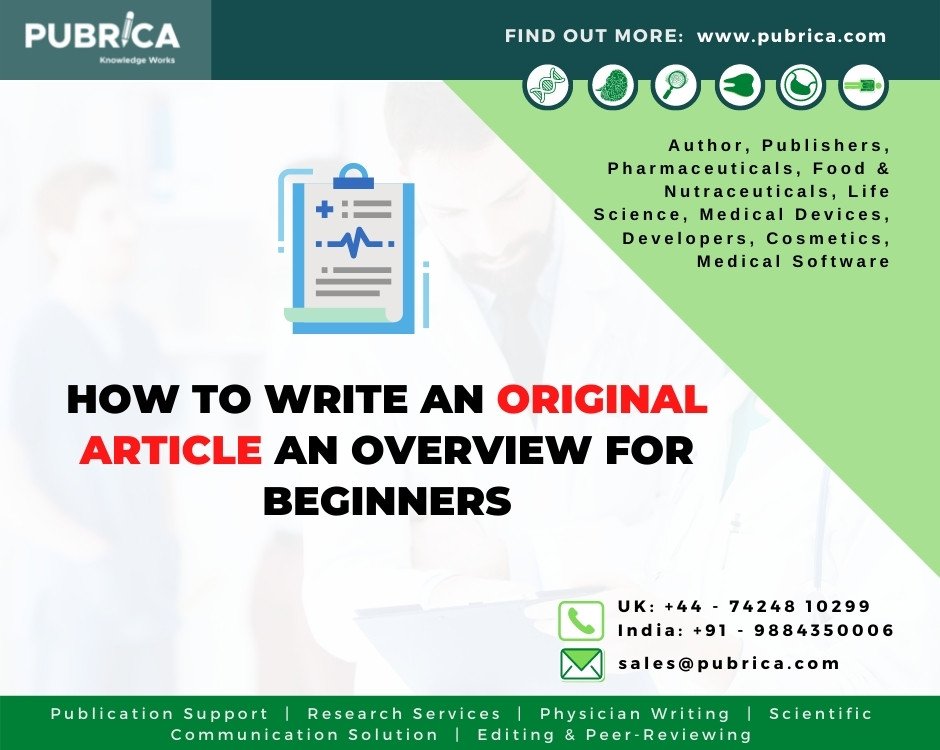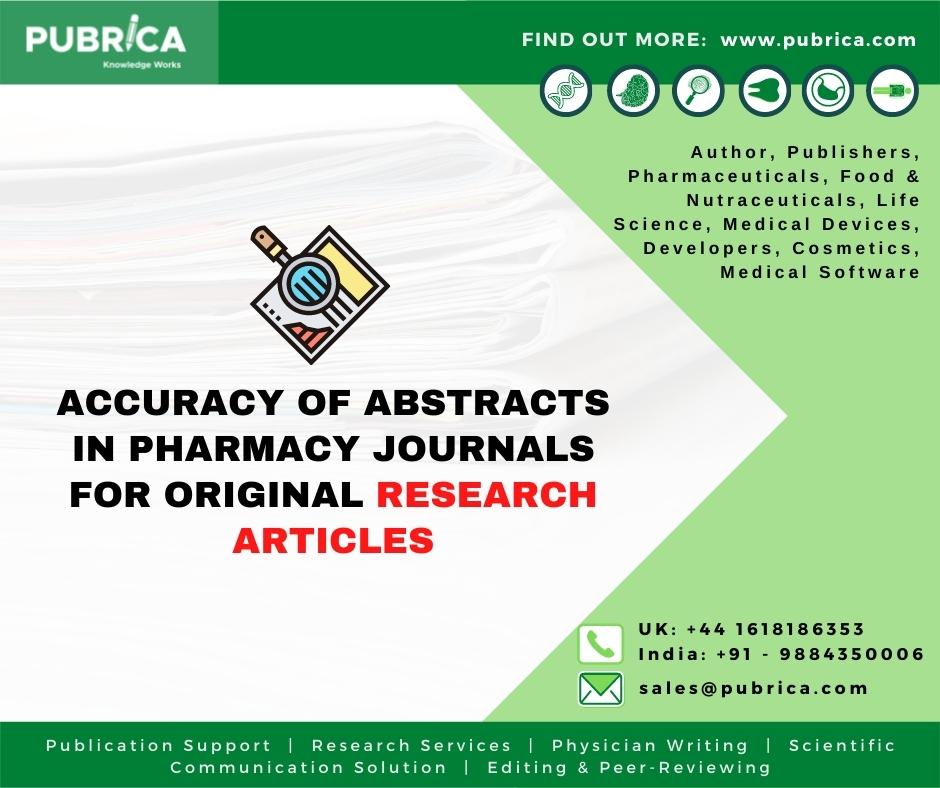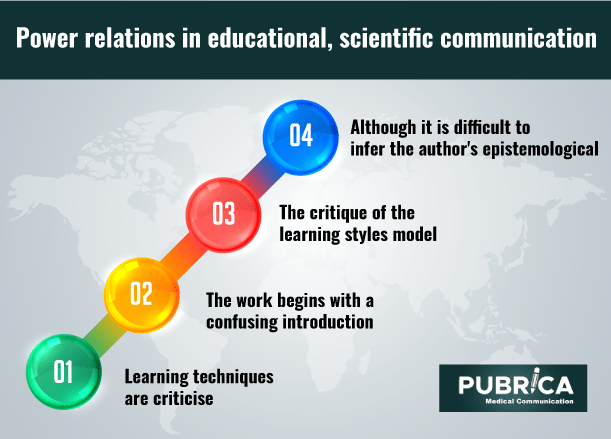
How to write an original article an overview for beginners
February 2, 2022
Accuracy of Abstracts in Pharmacy Journals for Original Research Articles
February 9, 2022In brief
Although learning style typologies have been heavily critiqued, many educationalists continue to utilise them. This paper argues that a hermeneutical approach is required to dispute learning styles. Four critical texts are subjected to critical discourse analysis (CDA) to discourage learning styles for educational objectives. As a result, the following three actions are taken: (1) a textual analysis incorporating argumentation style with a focus on epistemology and discursive practises, (2) a processing analysis involving interpretation, and (3) a social analysis tying the findings to educational power structures. CDA illustrates how these publications’ discourse on healthcare communication service-learning styles leads to unequal interactions between educational researchers and their audience. As discussed in these works, discourse offers little room for professional decision-making, and researchers establish themselves as specialists who can be relied upon. A better articulation of the discourse on learning styles might assist in the reduction of misconceptions in the field.
Introduction
The learning style idea has been heavily contested, and the validity of the typologies has been called into consideration. The acts of other teachers are thought to be more effective. Furthermore, the concept that training should be personalised to students’ learning styles has been questioned, as evidence of such tailored instruction’s efficacy is weak. Although not all typologies have been equally condemned medico marketing solution service, scholars pushing for evidence-based educational practice have discussed methodology difficulties. The most common argument used by challengers of learning styles is that the idea is invalid, implying that there are issues with the internal consistency of learning styles typologies and failing construct validity and predictive validity of various typologies. This lack of scientific truth has become common wisdom among researchers and teacher educators when using learning styles as an analytical category or as a basis for personalised teaching. They consistently warn against their usage or advocate for caution. Despite the fact that learning styles theory has been criticised, many educationalists continue to employ it.

Methods
A list of four essential publications was compiled. Several teacher education institutions in the Flanders region utilise the textbooks (Belgium). They select the most pertinent clinical research communication service literature that a teacher or teacher educator in the Dutch-speaking language region may be using while determining the suitability of learning styles in a classroom setting. The texts in the sample all have a critical focus on learning styles, but they are written in various ways to appeal to a wide range of audiences.
Text analysis: Descriptive step
Text A
Learning techniques are criticised using three primary arguments: (1) the premise that people can be grouped into various groups is unsupported by empirical evidence; (2) the information employed to do so is insufficient, as clustering is typically reliant on self-reporting; and (3) the significant number medical animation, medical Indexing of typologies is impractical.
Text B
The work begins with a confusing introduction in which several statements about learning styles are presented, followed by the video Abstract assertion that they are all “persistent myths.” This claim is supported by a quotation and is based on two key issues: (1) the absence of scientific evidence for learning styles and (2) the limited additional value of incorporating learning styles into the classroom.
Text C
The critique of the learning styles model (VAK-model), which distinguishes between auditory, visual, and kinesthetic learners, is used to warn against all forms of learning styles.
Text D
Although it is difficult to infer the author’s epistemological beliefs from the text itself, it is evident that he prefers neuroscientific evidence-based research to influence educational decision-making, implying a positivist epistemological belief.
Discussion: Explanatory step
The linking of discursive practises to actual Medical marketing materials power structures in society is essential in CDA. As a result, this part aims to examine the results of the textual analysis and subsequent interpretation and how they relate to current scientific communication literature.
Limitations and future research
It helps comprehend how the selection of articles produces a distinct discourse that employs various discursive techniques. Modern assumptions and ideas of individuality are challenged by postmodernism. Here decided not to discuss the relevance of learning styles in a postmodernist viewpoint because we concentrated on a hermeneutical perspective in the learning styles discussion.
Implications
Rather than contesting the existence of learning styles using power arguments, some research on learning styles employed the methodologies used by some studies on learning techniques. This would improve teachers’ ability to make professional decisions and provide them more excellent room to be experienced. Using this as a foundation, we argue that bringing a hermeneutical perspective to the learning styles debate adds significant value to the current ontological perspective.
About Pubrica
Science can be communicated in several ways, and Pubrica medical communication team offers the best integrated and customised solutions in the medico-market and convert into ting solutions to healthcare/pharmaceutical companies/food and beverage companies. We serve pharmaceutical, medical device manufacturers, hospitals, medical advertising, publishers, managed care organisations, academic medical centres, Information Technology Healthcare products /websites association.
References
- Smets, Wouter, and Katrien Struyven. “Power relations in educational scientific communication—a critical analysis of discourse on learning styles.” Cogent Education 5.1 (2018): 1429722.
- Brünger-Weilandt, Sabine. “E-Science–Advancing new ways of scientific communication.” Information Services & Use 27.4 (2007): 161-166.
